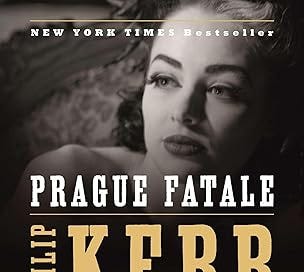I’ve been slowly working my way through the Bernie Gunther series, and Prague Fatale (https://amzn.to/4kESHuq) reminded me why I keep coming back.
It’s part murder mystery, part historical fiction, and all atmosphere. Set in 1941, the book picks up with Bernie—our German detective who doesn’t quite fit into the Nazi world he’s stuck in—getting dragged out to Prague by none other than Reinhard Heydrich. Yeah, that Heydrich. The guy known as "The Butcher of Prague." He’s holding a little gathering at his country estate, and one of his SS officers ends up dead. Locked room. No obvious killer. And Bernie’s told to solve it—while being watched by some of the most dangerous men in Europe.
So the setup is pure classic mystery, but what sets this book apart is Kerr’s ability to make the setting feel alive.
I visited Prague and Berlin in the last year, and reading this was eerie. The streets, buildings, and neighborhoods Kerr describes? Still there. You can walk the same cobbled lanes Bernie did. Stand in the same plazas. Ride past the same train stations. It’s like time folded in on itself. That’s something Kerr does better than almost any author I’ve read—he makes the place a character. Prague isn’t just a backdrop, it breathes. And it’s full of ghosts.
Bernie himself is still one of the most compelling characters in historical crime fiction. He’s no hero, but he’s not a villain either. He’s a guy who keeps getting put in impossible situations and does his best to hold on to some kind of moral center. He’s sharp, sarcastic, and just self-aware enough to know the line between survival and complicity. In this book, that line gets blurry fast.
The locked-room murder is a nice change of pace from the bigger political investigations in the earlier books. It’s a tighter, more focused mystery—but that doesn’t mean it’s simple. Everyone at that estate has secrets, and Bernie has to tiptoe through all of them without getting himself killed. The tension is real. You feel it in every conversation, every side-eye glance, every pause before someone answers a question.
And speaking of conversations—Kerr’s dialogue is so good. It’s dry, often darkly funny, and always reveals more than it seems to on the surface. The way Bernie navigates this shark tank of Nazi officials with just enough wit and just enough caution is masterful. You get the sense that one wrong joke could get him shot. And he tells the joke anyway.
Now, don’t expect big action scenes. This is a slow burn. A psychological game. The pace is deliberate, and Kerr takes his time letting things unfold. But it works. It builds pressure. You’re not just wondering whodunit—you’re wondering who’s going to make it out alive, including Bernie.
What really struck me, though, is how relevant this still feels. Yes, it’s set in WWII, but the themes—power, fear, compromise—those hit close to home. You watch Bernie operate in this twisted system, doing what he can without becoming part of it, and it makes you think: What would I do in his shoes?
Final thoughts? Prague Fatale is one of the best in the series. If you’ve read Kerr before, this one won’t disappoint. If you haven’t, you could even start here. The mystery holds up on its own, and you’ll get a great feel for who Bernie is.
And if you’ve ever been to Prague or Berlin—or plan to go—read this first. You’ll see those cities in a whole new way.
Highly recommend.
Have you read the book. I would love your thoughts in the comments below.




